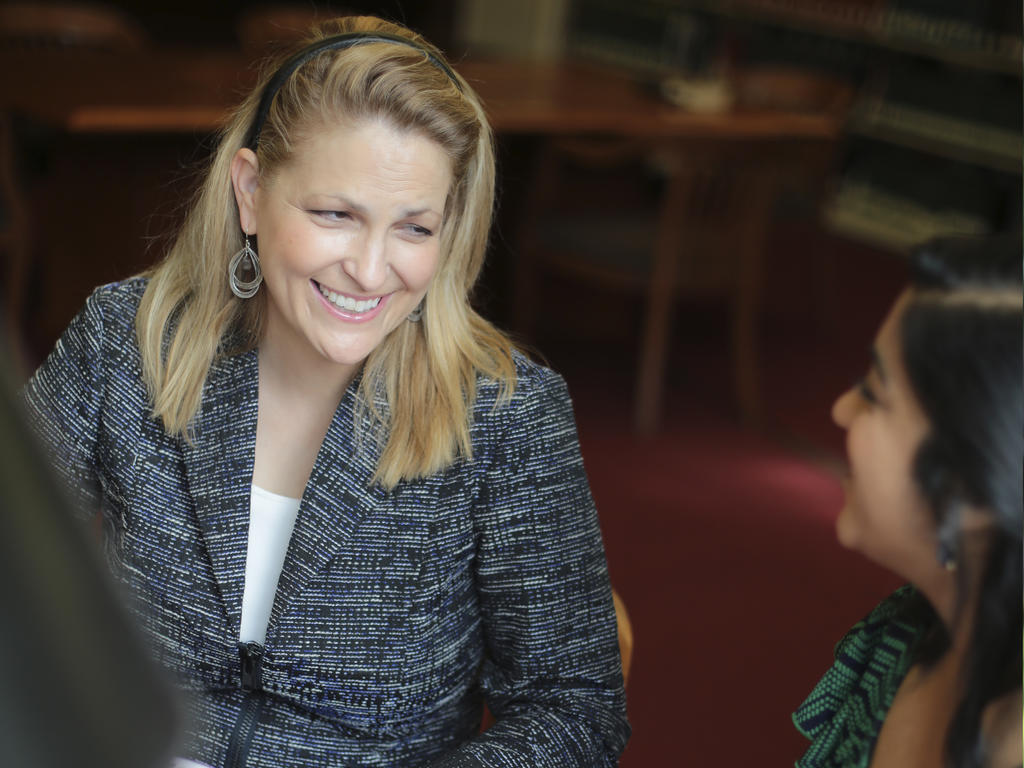By Richard J. Alley
In Dr. Amy Jasperson’s political science courses, students grow to know the good, the bad, and the ugly when it comes to campaign advertising. They not only become familiar with the techniques and various mediums, but with why such advertising works or not. And, they are challenged to convert classroom learning into applied situations that reflect the rapidly changing ways in which political communication shapes voter attitudes.
Jasperson’s innovative take on a traditional topic is pushing her students to analyze how they, and we as political consumers, think. Her hands-on style of teaching has made a multi-faceted subject even more compelling and has forged a bond with her students that is typical of the Rhodes experience.
Rachel Harris ’16, a political communication student, works side-by-side with Jasperson assisting her in research. The scholar-mentor relationship between Jasperson and Harris is a strong one and has propelled Harris to plan for her future in the field.
Through new courses such as Political Advertising, Jasperson integrates technology in the form of creative projects. Her goals are to have students learn not just the academic theories, but to question their preconceptions and to think about how the components of political messages might be persuasive or not, how they might resonate with different audiences. She begins first with a historical look at relevant advertising in newspapers, on through radio and television, and into the age of the Internet and social media—two forms that most of the students have grown up with.
“Students deconstruct messages that other people have created. They think about their own reactions and also consider how others might react differently to those same messages,” Jasperson says.
The students are asked to analyze sound and visuals in advertising, and to consider the emotions they evoke and their impact on an audience. To further that course of study, a creative advertising project requires students to create their own ads. For that, Jasperson collaborated with Liz Daggett, director of the Center for Outreach in the Development of the Arts (CODA) and assistant professor of art, to conduct a tutorial and make the project a more creative endeavor.
“Some students created compelling public service announcements and candidate spots using social media posts as well as traditional television ads. One student created an ad advocating for pre-K in Memphis, a campaign that was taking place during the semester,” says Jasperson.
Getting at the subject of political advertising from the inside out in this way is “challenging their conceptions of the true value of positive and negative information as well as the non-verbal aspects of messaging,” says Jasperson. Harris has found the lessons learned while at Rhodes to be extremely useful. So much so that the political science major is using the knowledge gleaned to work this summer on the Tom Cotton senatorial campaign in Arkansas.
“I think the thing that impresses me the most about Dr. Jasperson is her commitment to my entire education and not just the part that relates to her,” says Harris. “I started meeting with her my freshman year, first discussing becoming a political science major, and then talking about possible grad schools for political communication. So she really invested in my education and my future before she was ever my research advisor.”
Coupled with classroom lectures and discussions,research and class-related projects help guide students beyond their years at Rhodes. Onealum, Sean Evins ’08, graduated with a degree in political science and now works as a partnership manager in government and politics at Twitter, focused on assisting officials to use Twitter to reach their constituencies. He visited Rhodes and spoke to Jasperson’s class.
“He said when he graduated from Rhodes, this type of job was virtually non-existant in the political world,” Jasperson says. “So that’s how fast things are changing in the realm of technology, especially as it applies to politics and political campaigns.
